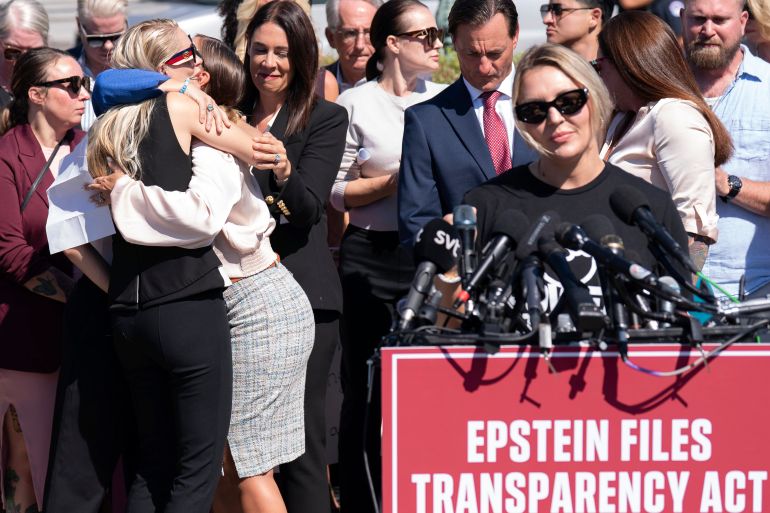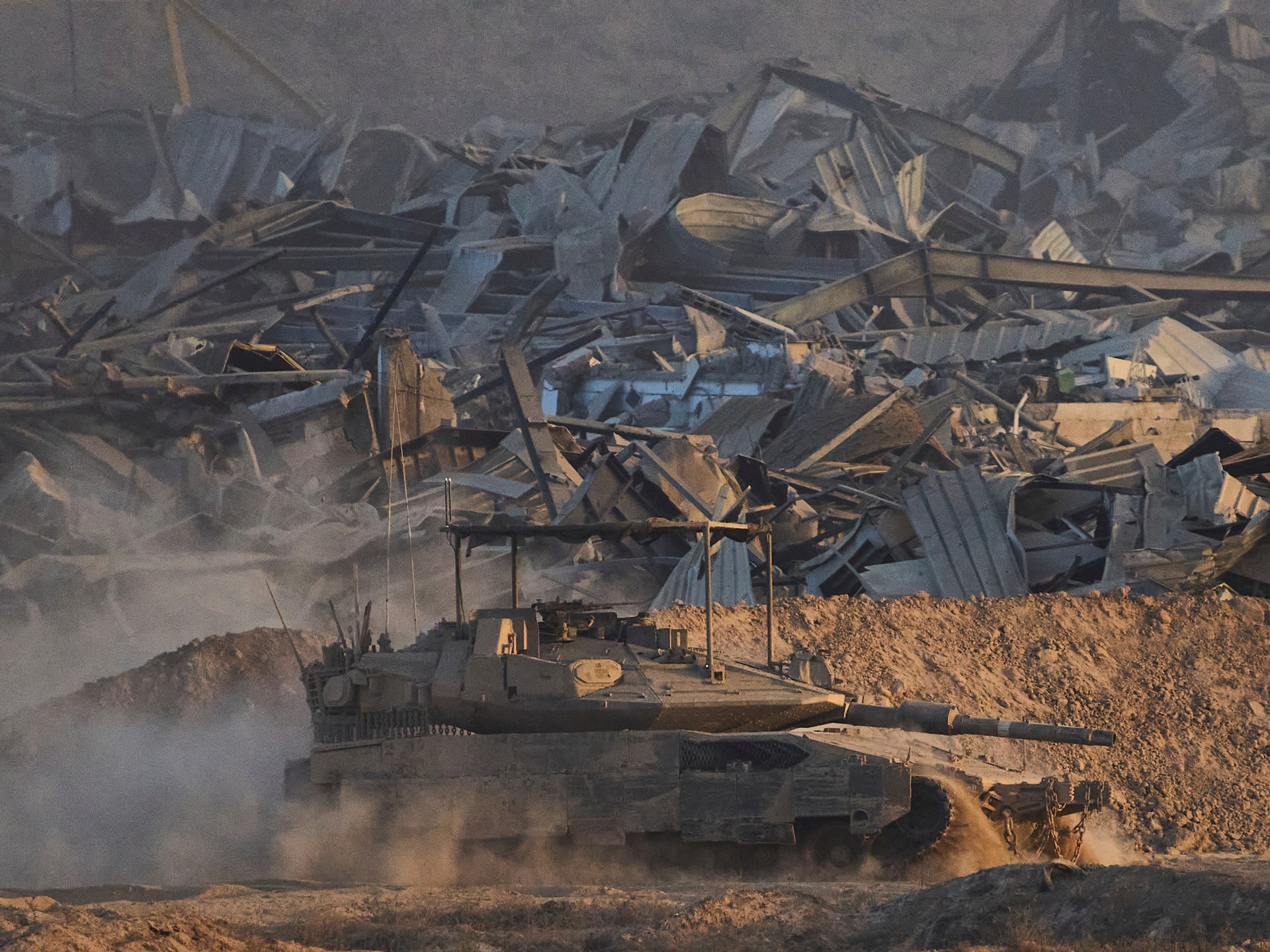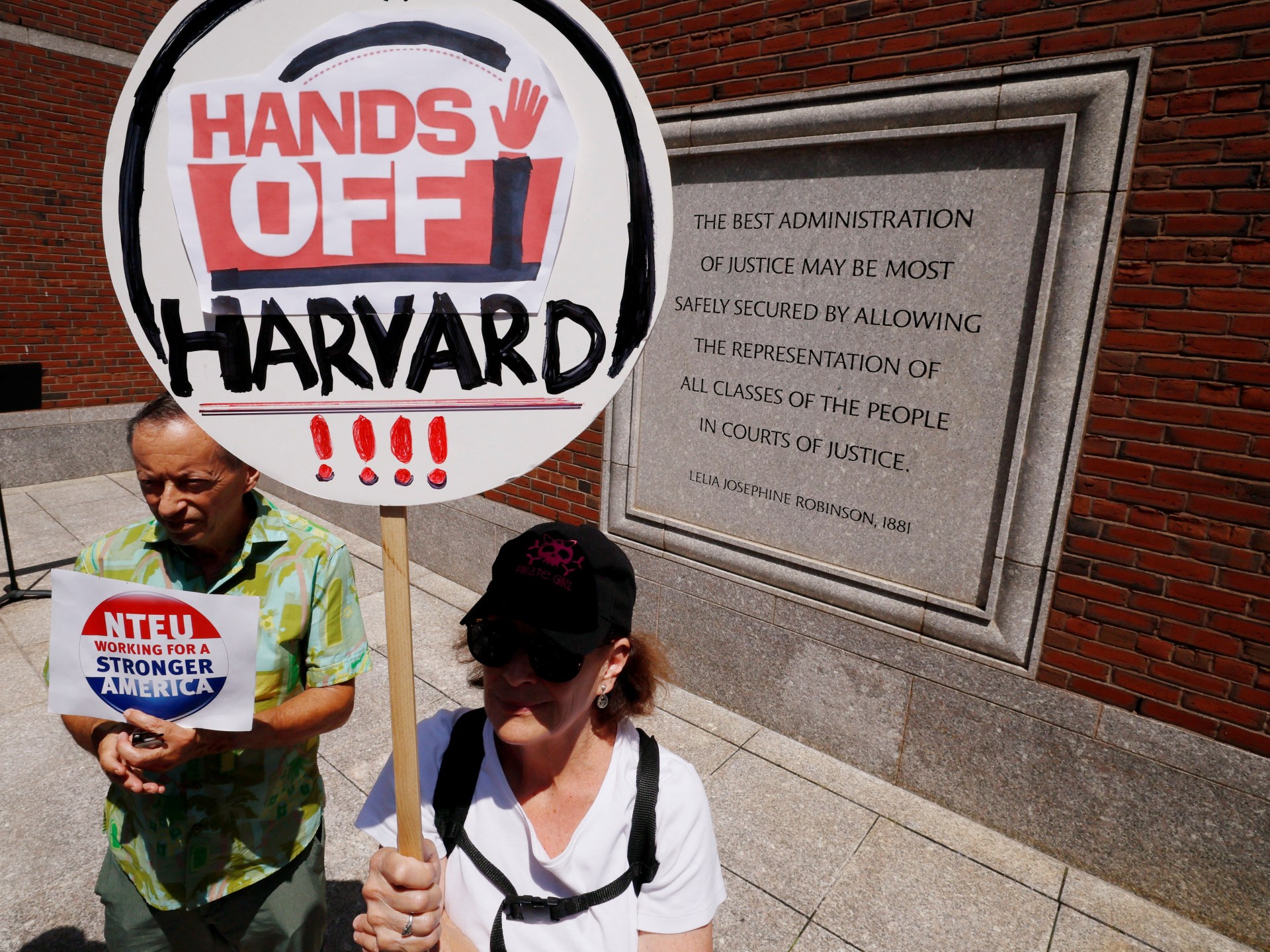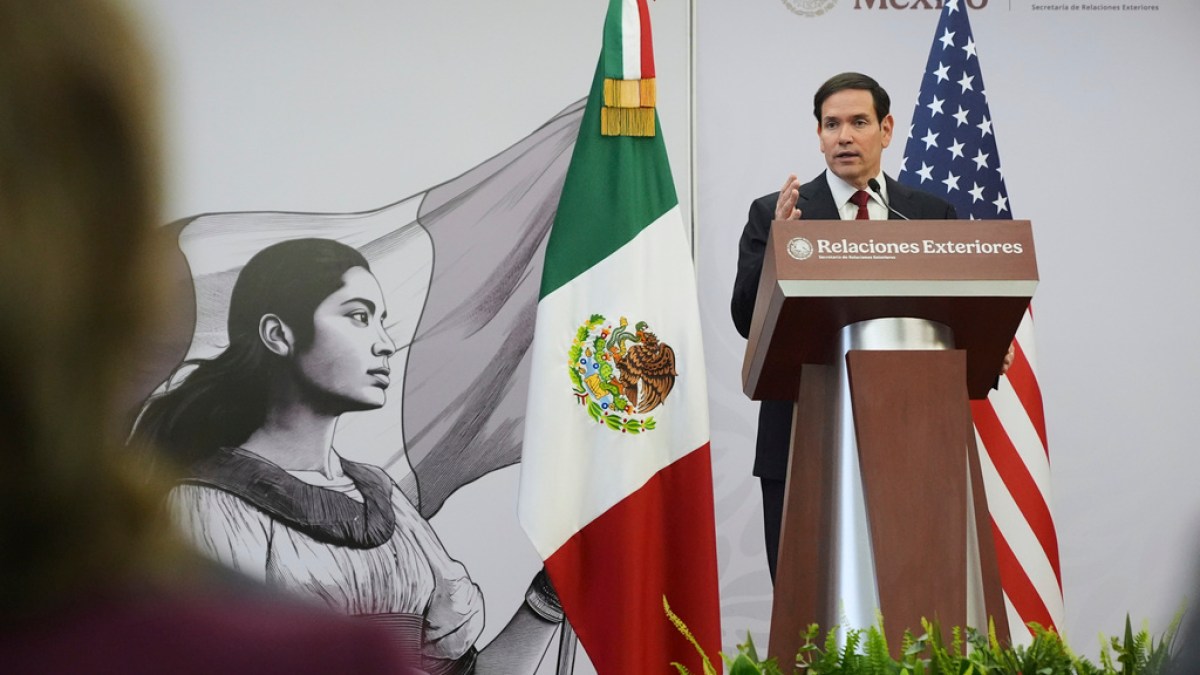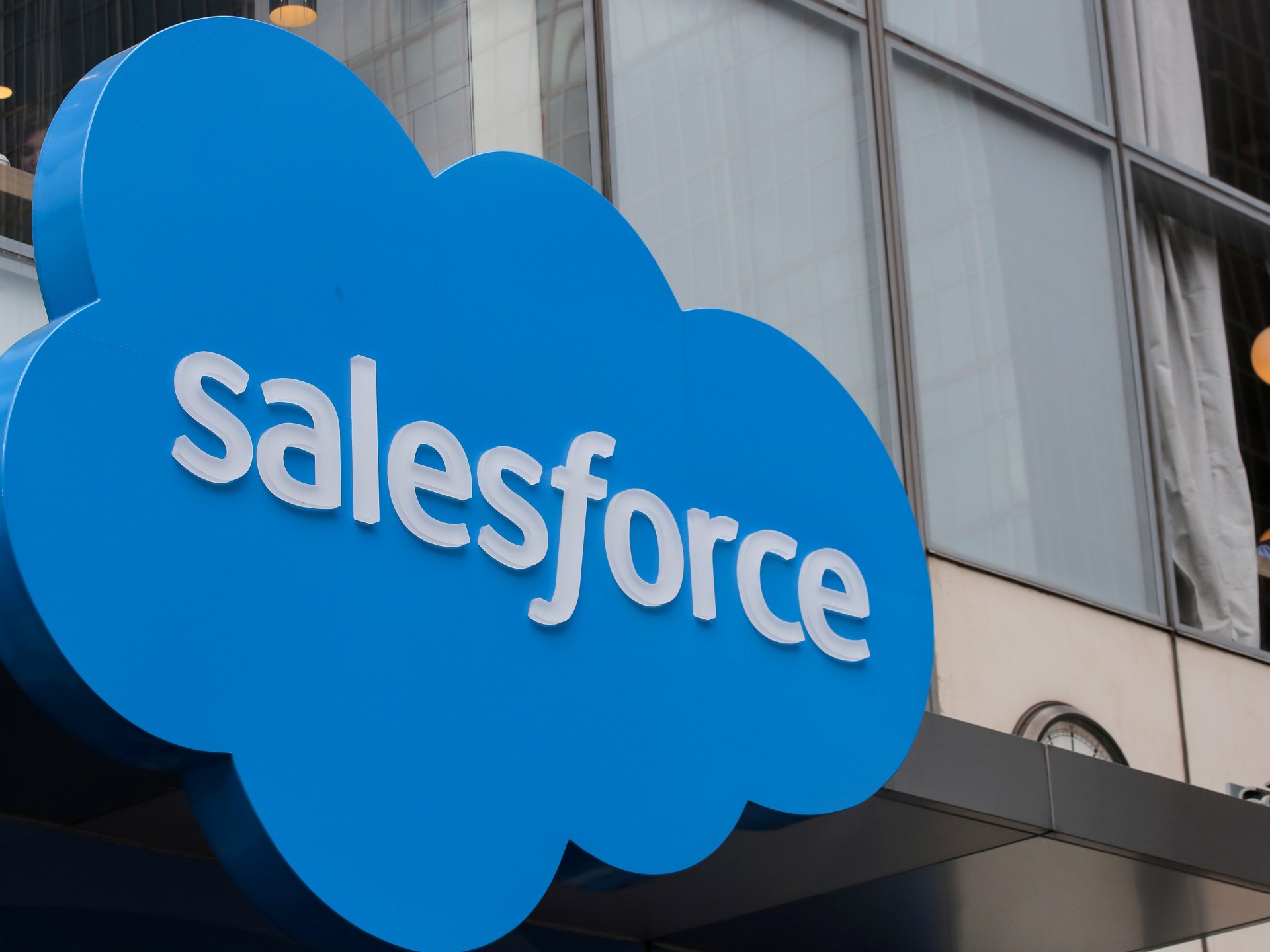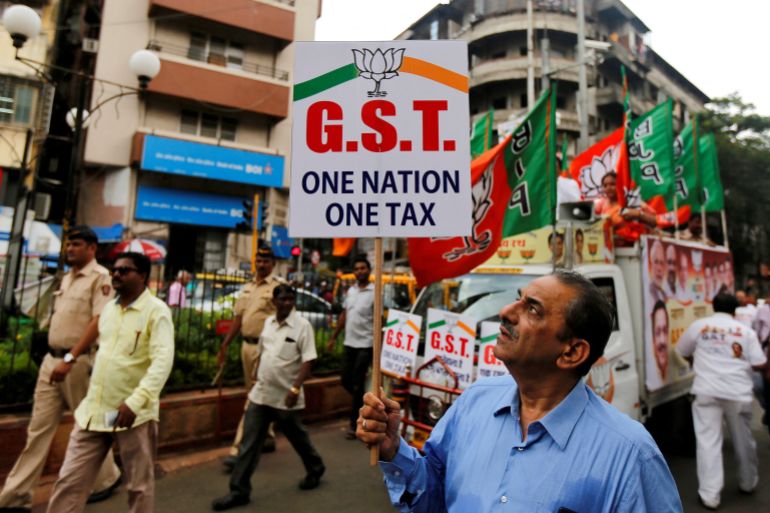Survivors who endured abuse at the hands of convicted sex offender Jeffrey Epstein gathered on the steps of the United States Capitol in Washington, DC, to demand greater transparency from the federal government.
Their appearance came as a bipartisan group of legislators pushed to pass the Epstein Files Transparency Act, a bill that would force Attorney General Pam Bondi to publish all unclassified information about the Epstein case.
On Wednesday, those legislators appeared side by side with the survivors, who shared their stories with supporters on the Capitol steps.
“This is about ending secrecy wherever abuse of power takes root,” said Anouska De Georgiou, a model who has spoken publicly about her experiences as a teenager being groomed and raped by Epstein.
She called upon Congress not only to pass the Epstein Files Transparency Act but to commit to helping survivors of sexual violence through legal aid and other forms of support.
“To be clear, the only motive for opposing this bill would be to conceal wrongdoing,” de Georgiou told the lawmakers. “You have a choice. Stand with the truth or with the lies that have protected predators for decades.”
Epstein died by suicide in his jail cell in 2019, but he is believed to have abused hundreds of underage girls during his decades as a high-powered financier.
Questions have lingered over how he could have evaded justice for so long and whether his vast network of powerful contacts played a role.
Donald Trump was among those Epstein appeared to have encountered socially, and the case has become a thorn in the side for the United States president.
As he campaigned for re-election last year, Trump teased he would release more files from the federal Epstein investigation should he win a second term. In September 2024, for instance, he told podcaster Lex Fridman he would “take a look” at releasing the files.
But since he took office in January, Trump’s supporters have been underwhelmed by the lack of revelations in the documents his administration has released.
Certain administration statements have also fuelled the conspiracy theories surrounding Epstein’s crimes. Rumours have long swirled that Epstein kept a client list to blackmail powerful people in government and industry.
And in February, Attorney General Bondi told Fox News such a list was “sitting on my desk right now”.
But in July, the Department of Justice and the Federal Bureau of Investigation jointly denied the existence of a client list and said there was no evidence of blackmail.
Still, Trump has sought to dispel scrutiny that his name might appear in unreleased files from the Epstein case.
On Wednesday, in an Oval Office meeting with the president of Poland, Trump was asked about the news conference happening outside in support of the Epstein Files Transparency Act.
He responded by framing the attention on Epstein as a politically motivated attempt to discredit his administration.
“So this is a Democrat hoax that never ends. You know, it reminds me a little of the Kennedy situation,” Trump said, referencing his release of files related to the assassination of former President John F Kennedy.
“We gave them everything over and over again, more and more and more, and nobody’s ever satisfied.”
Trump continued by saying that the Epstein case was a distraction from his administration’s work.
“They’re trying to get people to talk about something that’s totally irrelevant to the success that we’ve had as a nation since I’ve been president,” Trump said, adding that “it’s enough”.
Some of the survivors at the event, however, directed their comments directly towards the president, calling upon him to take their demands seriously. Haley Robson, one survivor, even invited Trump to meet with her in person.
“I am a registered Republican. Not that that matters because this is not political,” she told reporters.
Hearing the Epstein case described as a “hoax”, she added, was like “being gutted from the inside out”.
“It feels like you just want to explode inside because nobody again is understanding that this is a real situation,” Robson said. “These women are real. We’re here in person.”
Another survivor, actor Chauntae Davies, shared her story about hearing Epstein using powerful friends like Trump to build clout. She explained that Epstein even took her on a trip with former President Bill Clinton and “other notable figures”.
“Epstein surrounded himself, I’m sorry, with the most powerful leaders of our country and the world. He abused not only me but countless others, and everyone seemed to look away,” Davies said.
“The truth is, Epstein had a free pass. He bragged about his powerful friends, including our current president, Donald Trump. It was his biggest brag, actually.”
One survivor, Marina Lacerda, explained that Wednesday’s event was the first time she had ever spoken publicly about her experiences.
“ The only reason that I am here is because it feels like the people who matter in this country finally care about what we have to say,” Lacerda told the crowd gathered at the Capitol.
A Brazilian immigrant, she explained that she was a struggling 14-year-old, supporting her family, when she met Epstein.
At first, she said, he offered her money in exchange for massages. But soon, his control over her life forced her to drop out of school before she could complete the ninth grade.
“It went from a dream job to the worst nightmare,” she said, adding, “ I had no way out until he finally told me that I was too old.”
Just a day before the women gathered on Capitol Hill, the oversight committee in the US House of Representatives released 33,295 pages of records from the federal investigation into Epstein. But so far, there appears to be little new information among the trove of documents.
Still, US representatives like Democrat Ro Khanna, Republican Marjorie Taylor Greene and Republican Thomas Massie have pushed for a full release of all the documents available.
They appeared alongside the survivors at the Capitol on Wednesday.
“A nation that allows rich and powerful men to traffic and abuse young girls without consequence is a nation that has lost its moral and spiritual core,” Khanna said.
Massie, meanwhile, offered some pointed remarks about those who might dismiss the survivors’ suffering as a hoax.
“ I think it’s shameful that this has been called a hoax,” Massie said.
